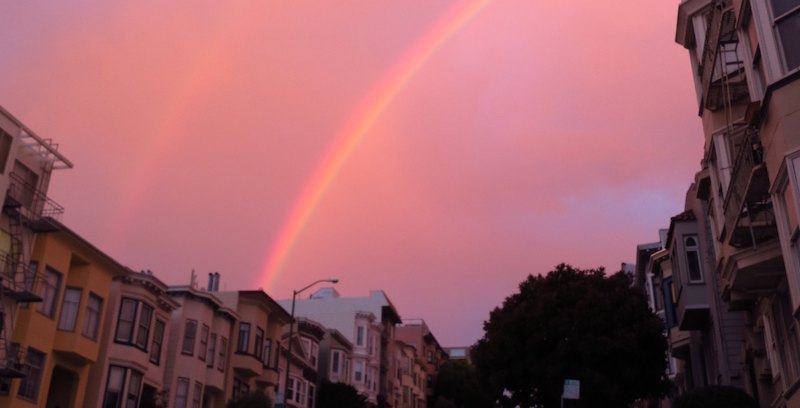
Five Books With Narrators Learning to Live in Unexpected Lives
Kelly Sundberg Recommends Titles to Read for Your New Life
There is a cognitive dissonance that survivors of gender violence like myself live with; it is the dissonance of living in a world where we feel both completely normal and alien at the same time. I thought for too long that this was the dissonance of post-traumatic stress disorder, but, in the near decade in which I have lived with PTSD, I’ve realized that the dissonance is not in the disorder itself; the dissonance is in the rest of the world continuing to exist as though we aren’t all, in some way, living with this disorder. I wrote my essay collection, The Answer is in the Wound: Trauma, Rage, and Alchemy in an attempt to both interrogate and understand—personally and culturally—the dissonance that haunts me.
When I had just left my abusive marriage, my therapist drew a picture of a seed for me, then a flower. She said, “You could only be a seed when you were with him. Now you can finally bloom.” I knew that she was right, yet somehow, I still struggled to bloom. What I came to realize during the many years of struggle to follow is how difficult it is to bloom in infertile soil. My trauma didn’t make me stronger. In fact, it nearly broke me. For a period, I became someone I hated—someone who was reactive, prickly, and chaotic. In order to live a life of self-respect and meaning, I had to learn to coexist with my constant rage, and then, to move from that coexistence to a kind of alchemy. The process of discovering how to convert my rage into strength was transmutation. I became stronger, wiser, more compassionate, and infinitely more authentic.
So much transformation is thrust upon us. We don’t all choose our metamorphoses. Still, though the soil may be hostile, we can bloom. There are so many beautiful books about learning to actually live in lives we didn’t choose, but here are the five that have been in my heart recently.
*
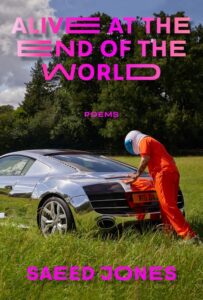
Saeed Jones, Alive at the End of the World
(Coffee House Press)
In 2022, Saeed Jones generously gave a reading from his book of poetry, Alive at the End of the World, to a small group of my creative writing students at the conservative, Christian college in rural Ohio where I taught at the time. Within the sometimes stifling campus culture, the English Department was a haven on campus for queer students, and as we read and discussed this book in advance of Jones’s reading, I could see the excitement of my students growing. There was excitement about the writing, which was crystalline and beautiful, but the real excitement was about Jones’s voice—his confidence, his humor, his willingness to be entirely himself. How could a book about grief be so alive? In these pages, where the title poem recurs in different forms, there is rage, sadness, and fear.
Still, the common thread that connects the poems is this deep sense of humanity, of obligation to humanity, and of what a gift it is to be human, even when the world is on fire around us. In my own book, I wrote about my decision to leave that school, about how I could no longer be affiliated with a university whose values were not in alignment with my own. It was the right decision, but I miss those students dearly, and I think of them often. I hope I helped them to feel more alive—more themselves—in my time there. I know that Saeed Jones did.
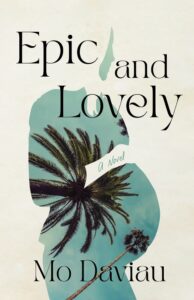
Mo Daviau, Epic and Lovely
(West Virginia University Press)
Mo Daviau’s novel, Epic and Lovely, an epistemological novel, unfolds in the form of a letter from Nina Simone Blaine, a woman with A12 Fibrillin Deficiency Syndrome (a genetic condition that affects connective tissue and can lead to early death) to Doctor Chen, the doctor who treated Nina throughout her life and adopted her baby at the end of it. With the support (and sometimes betrayal) of a motley group of friends, the Good Thumbs (that Nina calls a “death cult” because they all have A12), Nina embarks on a relationship with a charming but cruel man, Cole, who takes perverse pleasure in destroying people (the stronger the person, the better). Cole almost succeeds in destroying Nina too, but Nina’s spirit prevails. Daviau’s characters are nuanced and deeply complicated, and she writes through the lens of disability with honesty and humanity.
As Nina says, “I promise you that the only way to maintain your sanity at the end of a life is to always know who the villain in your story is. Because when that gets murky, you fall in love with the wrong person. You’ll live for a ghost. You’ll die for a ghost too.” That wisdom—to know who the villain in your story is—carries through to a satisfying conclusion that will leave readers breathless. Ultimately, this book is a book about wanting to be chosen, but it’s also a book about choices and the power contained within them.
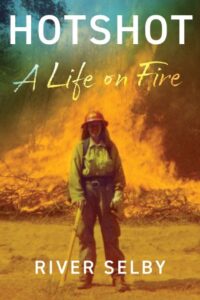
River Selby, Hotshot: A Life on Fire
(Atlantic Monthly Press)
In the memoir, Hotshot: A Life on Fire, River Selby writes about a being a highly skilled wildland firefighter for the US Forest Service. By braiding research about forest fires, colonization, and the federal government with details of Selby’s abusive childhood, struggles with an eating disorder, sexual assault, and their mother’s death by suicide, Selby gives readers insight into the ways that both externalized and internalized patriarchy haunted their time in the federal forests. As someone who also worked for the US Forest Service, I’m in a unique position to relate to Selby’s experiences in this male dominated industry, but within the agencies, fire is known for having the biggest and brashest male presence, and Selby’s descriptions of the harassment that they experienced are so clear and cleanly told. Still, there is a love in these pages both for the crews and for the work itself. There are no easy answers to be found in these powerful pages, but Selby shows readers what’s possible in an otherwise chaotic life when we can find stability in hard work and authenticity. More than anything though, this book is a love letter to queerness and found family.
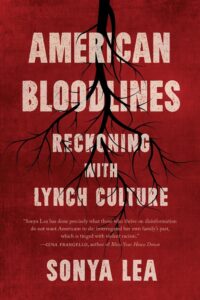
Sonya Lea, American Bloodlines: Reckoning with Lynch Culture
(University Press of Kentucky)
In American Bloodlines: Reckoning with Lynch Culture, Sonya Lea does a deep dive into her white family’s connection to the last documented public execution in the United States, and Lea is unsparing in what she investigates and reveals. She is just as unsparing in her interrogation of her own whiteness and white supremacy. “Today’s white women show up in yoga culture, in the white healing industry, on white nonprofit boards, as white social justice activists, and as white social media influencers, and these roles invest heavily in the denial of the power of collective perpetration,” she writes. Perhaps more than anything, this is a book about that collective perpetration, and the ways in which all of us must reckon with our own harmful behaviors if we want to create a more just world. Lea’s journey and writing is an inspiration for those of us who may be scared to really see ourselves and our legacies; she shows readers that it’s possible.
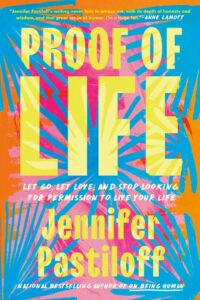
Jennifer Pastiloff, Proof of Life: Let Go, Let Love, And Stop Looking For Permission to Live Your Life
(Dutton)
Jennifer Pastiloff’s, Proof of Life, is more straightforward than the previous books on this list. It’s a road map for navigating change, blame, and shame, and aren’t there times when we all just really crave a map for how to live our lives? Written with Pastiloff’s signature wry and warm humor, the book tells stories from Pastiloff’s own, fascinating life, but it also gives the reader explicit advice. Suggestions such as saying a “Body Prayer” to help with disembodiment, to “stop tsk-tsking,” to saving our ruminating for the morning rather than bedtime, and so much more. As a yoga instructor and creative, Pastiloff’s writing reads like the sage wisdom of a big sister who has done deep and heavy work on herself. In this book, she gives readers the gift of those hard-earned lessons. “We have to give ourselves the permission and the medal, which so often go hand in hand,” she writes. “We can spend our lives waiting if we don’t. We can only save ourselves, choose ourselves, give ourselves the permission.”
_________________________
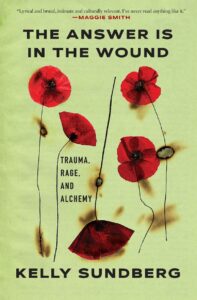
Kelly Sundberg’s The Answer Is in the Wound is available now from Roxane Gay Books.
Kelly Sundberg
Kelly Sundberg is the author of Goodbye, Sweet Girl, published by Harper in 2018. Her essays have been featured in Best American Essays in 2013, 2015, 2016, and 2018, and her writing has appeared in the New York Times Modern Love column, Los Angeles Review, and The Rumpus. She has a PhD in creative nonfiction and she lives, writes, and edits in Columbus, Ohio.



















